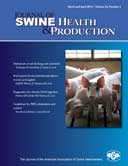Abstract:

Diagnostic assessment and lesion evaluation of chronic deoxynivalenol ingestion in growing swine
Darin M. Madson, DVM, PhD, Diplomate ACVP; Steve M. Ensley, DVM, MS, PhD; John F. Patience, MS, PhD; Phil C. Gauger, DVM, MS, PhD; Rodger G. Main, DVM, PhD
Complete article is available online.
PDF version is available online.
Deoxynivalenol (DON) is a common mycotoxin contaminant of cereal grains and is associated with reduced feed intake or refusal in swine. The objective of this assessment was to determine if diagnostic tests or lesions could assist in diagnosing chronic DON ingestion in swine. Twenty-four 11-week-old cross-bred pigs of both genders were fed either an ad libitum diet without deliberate contamination of DON (Control; n = 6) or a diet containing approximately 5 mg per kg DON (DON-fed; n = 18). Dried distillers’ grains with solubles were the source of DON for the diets. Serum analytes were measured at the beginning and conclusion of the 120-day study. All pigs were necropsied and liver analyte concentrations, bone density, and bone ash were determined. Differences in serum analyte concentrations, macroscopic or microscopic lesions, and bone ash and density were not detected between treatment groups (P > .05). Liver selenium concentrations were lower (P = .02) in DON-fed pigs. Results suggest DON ingestion is not correlated with lesions or bone integrity, but can significantly lower liver selenium concentrations.
Keywords: deoxynivalenol, DON, selenium, vomitoxin
![]() Cite as: Madson DM, Ensley SM, Patience JF, et al. Diagnostic assessment and lesion evaluation of chronic deoxynivalenol ingestion in growing swine. J Swine Health Prod 2014;22(2):78-83.
Cite as: Madson DM, Ensley SM, Patience JF, et al. Diagnostic assessment and lesion evaluation of chronic deoxynivalenol ingestion in growing swine. J Swine Health Prod 2014;22(2):78-83.
Search the AASV web site for pages with similar keywords.
